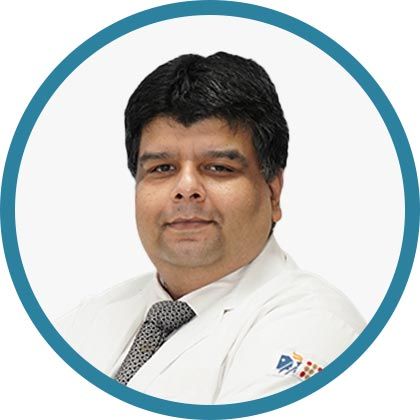Consult Neuropsychiatrists Online (12 doctors)

Dr Rajan Kharb
Psychiatrist
9 Years • MBBS, MD psychiatry
Delhi
KPC Mind clinic, Delhi
50+ recommendations
Dr. Joydeep Biswas
Neurologist
15 Years • MBBS, DNB General Medicine, DNB Neurology
Barasat
Diab-Eat-Ease, Barasat

Dr. Rahul Bagale
Psychiatrist
14 Years • MBBS, DPM, DHM, MIPS
Pune
Apollo Clinic, Viman Nagar, Pune

Dr. M B Pethe
Psychiatrist
44 Years • MBBS, MD (Neuropsychiatry)
Pune
Apollo Clinic, Wanowrie, Pune

Dr. Manjunath H
Neuro Psychiatrist
20 Years • MBBS, DPM
Bengaluru
Apollo Clinic, Indiranagar, Bengaluru
50+ recommendations

Dr Pooja Dubey Sonawane
Psychiatrist
7 Years • MBBS DPM
Pune
Apollo Clinic, Nigdi, Pune

Dr Abhay Sikaria
Neurosurgeon
7 Years • MBBS, M.S (GENERAL SURGERY), MCH (NEUROSURGERY)
Bengaluru
Apollo Clinic, Koramangala, Bengaluru

Dr Sumit Modi
Psychiatrist
10 Years • MBBS MD
Lucknow
Apollo Clinic Hazratganj, Lucknow

Dr. Brig. Prof. Prafulla Kumar Sahoo
Neurologist
36 Years • MBBS ( Utkal ), MS ( General Surgery, AFMC-Pune ), MCh ( Neuro Surgery, AllMS, New Delhi ) . Chief Consultant - Brain, Neuro, Spine & Radio Surgery.
Bhubaneswar
Apollo Hospitals Old Sainik School Road, Bhubaneswar
50+ recommendations

Dr. Harshil Shah
Psychiatrist
4 Years • MBBS, Psychiatry ( MD Psychiatry), MIPS
Ahmedabad
Apollo Hospitals Gandhinagar, Ahmedabad
100+ recommendations

Dr. Umar Mushir
Neuro Psychiatrist
10 Years • MBBS, MD (Psychiatry)
Lucknow
Apollomedics Super Speciality Hospital, Lucknow
100+ recommendations

Dr. Angshuman Das
Neuro Psychiatrist
15 Years • MBBS(Hons),DPM,MRC Psych(London), PG Dip. CST(UK), Msc Psychiatry (UK), FRSM (London),CCT(UK))
Kolkata
Apollo Multispeciality Hospitals , Kolkata, Kolkata
150+ recommendations
Neuropsychiatry
At Apollo 24|7, booking an appointment with a top neuropsychiatrist is just a few clicks away. Our user-friendly online platform allows you to easily schedule a consultation with a trusted specialist at your convenience. With a wide network of experienced neuropsychiatrists and well-equipped hospitals and clinics, Apollo 24|7 ensures that you receive the best possible care for your neuropsychiatric concerns. Don't let your mental health take a backseat; book your appointment with a neuropsychiatrist today and take the first step towards a healthier, happier you.
What is Neuropsychiatry?
Neuropsychiatry is a branch of medicine that bridges the knowledge gap between neurology and psychiatry. It primarily deals with understanding the neurobiological foundations of psychiatric disorders. This speciality delves into how disorders of the nervous system contribute to psychiatric symptoms and vice versa, thereby providing a comprehensive approach to diagnosing and treating complex conditions that overlap between the two fields.
Neuropsychiatry plays a crucial role in healthcare by offering insights and treatments for conditions that have both neurological and psychiatric dimensions. Its relevance is particularly significant in addressing conditions like depression, schizophrenia, bipolar disorder, and dementia, all of which may have underlying neurological contributions.
By integrating neurological and psychiatric perspectives, neuropsychiatry enhances the understanding and management of these multifaceted disorders, aiming to improve patient outcomes significantly.
Who is a Neuropsychiatrist?
A neuropsychiatrist is a medical doctor who specialises in neuropsychiatry. These specialists possess a deep understanding of both the neurological aspects of the brain and the psychiatric symptoms that may arise from neurological disorders. Typically, a neuropsychiatrist holds qualifications in both neurology and psychiatry, having completed extensive training in these areas after their general medical education.
The role of a neuropsychiatrist is vital in managing conditions that straddle the line between neurology and psychiatry. They are equipped to handle complex cases where neurological disorders manifest with psychiatric symptoms or where psychiatric conditions are influenced by neurological factors.
Common conditions managed by neuropsychiatrists include cognitive disorders, epilepsy with psychological symptoms, and psychiatric manifestations of neurological diseases. Their expertise is essential in providing targeted treatment that addresses both the physical and mental health aspects of these conditions.
Neuro psychiatrists are pivotal in delivering holistic care that addresses the intertwined nature of neurological and psychological health.
What Does a Neuropsychiatrist Do?
A neuropsychiatrist is a specialised medical professional who combines the disciplines of neurology and psychiatry to diagnose and treat patients with complex neurological and psychiatric conditions. Their expertise is critical in understanding how neurological abnormalities influence mental health disorders and vice versa.
Key Responsibilities:
Diagnosis: Neuropsychiatrists assess patients using a variety of tools including neurological examinations, psychiatric evaluations, and neuroimaging to diagnose conditions that have both neurological and psychiatric aspects.
Treatment Planning: They develop comprehensive treatment plans that may include medication, psychotherapy, and sometimes neurorehabilitation, tailored to each patient’s specific needs.
Patient Management: Ongoing management of patients, adjusting treatment plans as the patient's condition evolves and responding to changes in their mental and neurological health.
Daily Activities:
Consultations: They conduct detailed patient consultations to gather medical histories, symptoms, and other relevant information.
Interdisciplinary Collaboration: Neuropsychiatrists often work closely with other healthcare professionals, including neurologists, psychologists, and occupational therapists, to provide a coordinated approach to patient care.
Research and Development: Many neuropsychiatrists are involved in research activities aimed at developing new therapeutic strategies and improving existing ones.
Education and Advocacy: Educating patients and their families about conditions and treatments, and advocating for patient needs within the healthcare system.
What are the Other Sub-specialities of Neuropsychiatry?
Neuropsychiatry encompasses several sub-specialities, each focusing on specific patient demographics and types of disorders. Understanding these sub-specialities can help readers appreciate the breadth of expertise within this complex field.
Child and Adolescent Neuropsychiatry: This sub-speciality deals with neuropsychiatric disorders in younger populations. It addresses conditions like ADHD, autism spectrum disorders, and learning disabilities, ensuring early intervention and tailored treatments to support developmental needs.
Geriatric Neuropsychiatry: Focusing on the elderly, geriatric neuropsychiatry manages age-related psychiatric and neurological conditions such as Alzheimer's disease and late-life depression. This sub-speciality ensures that the unique challenges of older patients are met with empathy and expertise.
Addiction Neuropsychiatry: Specialists in this area treat substance abuse disorders and the neurological and psychiatric aspects of addiction. Effective treatment plans often include both medication management and psychotherapy to address the complex interplay between addiction and mental health.
Cognitive and Behavioral Neuropsychiatry: This sub-speciality focuses on cognitive impairments and behavioural issues stemming from neurological conditions. Treatments are often multidisciplinary, involving cognitive rehabilitation and behavioural therapies.
Neurodevelopmental Disorders: Specialists in this area focus on disorders that appear in childhood and affect neurological development, such as intellectual disabilities and motor disorders. Early diagnosis and intervention are crucial in managing these conditions.
Neurodegenerative Disorders: This area deals with diseases like Parkinson's and Huntington's, where progressive brain damage leads to cognitive and physical decline. Managing these conditions requires a nuanced approach that may include drug therapy and supportive care.
Psychopharmacology: A critical area of neuropsychiatry, psychopharmacology involves the study and application of medications that affect brain chemistry to treat psychiatric disorders. A doctor for neuropsychiatric disorders is well-versed in the latest pharmacological treatments to optimise patient care.
Traumatic Brain Injury Neuropsychiatry: Specialising in the aftermath of brain trauma, this sub-speciality addresses cognitive, emotional, and behavioural symptoms resulting from traumatic brain injuries. A brain doctor plays a crucial role in the rehabilitation of these patients.
Incorporating these sub-specialities within neuropsychiatry allows a neuropsychiatrist for depression, and other conditions to provide specialised care tailored to the unique needs of different patient groups.
Whether it's a doctor for cognitive disorders or a doctor for behavioural issues, professionals in this field are equipped to handle a wide range of challenges, making them invaluable in the landscape of modern medicine.
What are the Neuropsychiatry Examinations or Tests Performed by the Neuropsychiatry?
Neuropsychiatrists utilise a variety of examinations and tests to accurately diagnose and manage conditions at the intersection of neurological and psychiatric disorders. These diagnostic tools are essential for understanding the underlying brain functions and structures associated with neuropsychiatric symptoms.
Neuropsychological Tests: These assessments evaluate cognitive functions such as memory, attention, problem-solving, and language skills. They help in diagnosing conditions like dementia, brain injuries, and developmental disorders. By understanding cognitive deficits, neuropsychiatrists can tailor treatment strategies effectively.
Brain Imaging Studies: Techniques like MRI (Magnetic Resonance Imaging), CT (Computed Tomography) scans, and PET (Positron Emission Tomography) scans are commonly used. These imaging tests provide detailed pictures of the brain's structure and activity, aiding in the diagnosis of tumours, brain damage, and other neurological conditions.
Electroencephalogram (EEG): An EEG measures electrical activity in the brain. It's particularly useful in diagnosing epilepsy and other seizure disorders. By recording brain wave patterns, neuropsychiatrists can identify abnormalities that may influence psychiatric symptoms.
Psychiatric Evaluations: Comprehensive psychiatric assessments are conducted to evaluate the mental health conditions and behavioural disorders. These evaluations involve detailed interviews and may use specific psychiatric scales to measure the severity and impact of symptoms.
Genetic Testing: For conditions suspected to have a genetic component, such as certain neurodegenerative disorders, genetic testing can be instrumental. It helps in understanding the risk factors and confirming diagnoses.
Utilising these tests, neuropsychiatrists can provide a thorough evaluation of both the neurological and psychiatric aspects of a patient’s health, allowing for comprehensive treatment planning. Whether you need to book neuro psychiatrists for a professional assessment or seek a psychiatrist for brain and mind for ongoing conditions, these examinations form the cornerstone of effective neuropsychiatric care.
What are the Common Conditions & Diseases that Neuropsychiatrists Treat?
Neuropsychiatrists are skilled in treating a wide array of conditions that intertwine neurological and psychiatric symptoms. Here are the top 15 conditions they commonly manage:
Depression: Characterised by persistent sadness and a lack of interest in external activities, often accompanied by physical symptoms such as sleep disturbance and fatigue.
Anxiety Disorders: Includes conditions such as generalised anxiety disorder and panic disorder, where patients experience excessive worry, nervousness, and fear.
Bipolar Disorder: A mental health condition marked by extreme mood swings, including emotional highs (mania or hypomania) and lows (depression).
Schizophrenia: A disorder that affects a person's ability to think, feel, and behave clearly, characterised by hallucinations, delusions, and extremely disordered thinking.
Dementia: A group of conditions characterised by impairment of at least two brain functions, such as memory loss and judgement, severely affecting daily functioning.
Alzheimer’s Disease: A progressive neurodegenerative disease that causes brain cells to waste away and die, leading to significant cognitive decline.
Parkinson’s Disease: A degenerative disorder of the central nervous system mainly affecting the motor system, leading to tremors, rigidity, and slow movement.
Obsessive-Compulsive Disorder (OCD): An anxiety disorder characterised by recurrent, unwanted thoughts (obsessions) and repetitive behaviours (compulsions).
Post-Traumatic Stress Disorder (PTSD): A disorder that develops following the witnessing or experiencing of a traumatic or terrifying event, causing severe anxiety and flashbacks.
Traumatic Brain Injury (TBI): Results from a violent blow or jolt to the head or body, causing temporary or permanent neurological impairment.
Attention Deficit Hyperactivity Disorder (ADHD): Characterised by patterns of inattention, hyperactivity, and impulsivity that affect functional development.
Autism Spectrum Disorder (ASD): A developmental disorder that affects communication and behaviour, often noticed in the early developmental stages of a child.
Epilepsy: A central nervous system disorder in which brain activity becomes abnormal, causing periods of unusual behaviour, sensations, and sometimes loss of awareness.
Multiple Sclerosis (MS): A disease of the central nervous system that disrupts the flow of information within the brain, and between the brain and body.
Addiction: Involves the abuse of substances like alcohol and drugs, where the brain's neurochemistry is altered, requiring comprehensive management strategies.
Reasons to See a Neuropsychiatrist
Consulting a neuropsychiatrist is essential when experiencing symptoms that suggest complex interplay between neurological and psychological aspects of health. Here are the primary reasons to seek their expertise:
Complex Diagnoses: When symptoms span both neurological and psychiatric categories, such as memory loss combined with mood swings, a neuropsychiatrist can provide a comprehensive assessment.
Persistent Symptoms: If traditional treatments for psychological symptoms don't lead to improvement, it might indicate an underlying neurological issue.
Unexplained Neurological Symptoms: For symptoms like seizures, sudden lapses in consciousness, or unexplained cognitive decline, a neuropsychiatrist's input is crucial.
Management of Chronic Conditions: For ongoing management of conditions like Alzheimer's or schizophrenia, where symptoms affect both brain and behaviour.
Specialised Treatment Plans: Crafting tailored treatment strategies that address both mental health and neurological conditions effectively.
For those who cannot visit in person, an online neuro psychiatrists consultation offers a convenient way to access specialised care from home.
What Types of Procedures do Neuropsychiatrists Perform?
Neuropsychiatrists are skilled in a range of procedures that cater to the diagnosis, management, and treatment of disorders that encompass both neurological and psychiatric aspects. These procedures are generally categorised into therapies and surgeries [performed in collaboration with neurosurgeons].
Top Therapies:
Cognitive Behavioural Therapy (CBT): A psychotherapeutic treatment that helps patients manage problems by changing the way they think and behave.
Electroconvulsive Therapy (ECT): Used primarily for severe depression, ECT involves small electric currents passed through the brain, intentionally triggering a brief seizure to cause changes in brain chemistry.
Transcranial Magnetic Stimulation (TMS): A noninvasive procedure that uses magnetic fields to stimulate nerve cells in the brain to improve symptoms of depression.
Pharmacotherapy: The use of pharmaceutical drugs to treat psychiatric disorders, carefully managed to balance effectiveness with side effects.
Psychoeducation: Educating patients and their families about disorders to help manage expectations and understand treatment plans.
Behavioural Management Techniques: Used for managing behavioural symptoms in neurodevelopmental and neurodegenerative disorders.
Neuropsychological Rehabilitation: A therapy aimed at improving or compensating for cognitive and emotional impairments.
Top Surgeries:
Deep Brain Stimulation (DBS): Involves implanting electrodes within certain areas of the brain to regulate abnormal impulses.
Vagus Nerve Stimulation (VNS): A procedure that involves implantation of a device that stimulates the vagus nerve with electrical impulses.
Gamma Knife Surgery: Uses focused doses of radiation to treat abnormalities in the brain, including those affecting behaviour and cognition.
Lobotomy (rarely used today): An outdated surgical procedure that involves cutting or scraping away most connections to and from the prefrontal cortex, historically used for severe psychiatric conditions.
The choice of procedure by a neuropsychiatrist depends on the specific needs of the patient and the severity of the condition. Understanding the neuro psychiatrists fee and other factors is essential when considering these advanced therapeutic and surgical options.
Why Choose an Apollo 24|7 Neuropsychiatrist?
Apollo 24|7 neuropsychiatrists are highly qualified and experienced in managing complex neurological and psychiatric conditions. Our team of experts provides personalised care, utilising advanced treatment options and cutting-edge technology to ensure the best possible outcomes for our patients.
With Apollo 24|7, you can access seamless consultations, both online and in-clinic, for your comprehensive healthcare needs. Our neuropsychiatrists work closely with other specialists to provide a multidisciplinary approach to your care, ensuring that you receive the most effective treatment tailored to your specific needs.
What to Expect When Visiting a Neuropsychiatrist?
Visiting a neuropsychiatrist involves a thorough evaluation of both neurological and psychiatric symptoms to ensure a comprehensive diagnosis. The process is patient-focused, aiming to create a tailored treatment plan for individual needs.
Initial Consultation: The visit usually begins with a detailed discussion of your medical history, symptoms, and any previous treatments. This helps the specialist understand the full scope of your condition.
Diagnostic Assessments: Patients may undergo neurological exams, psychiatric evaluations, or specific diagnostic tests such as brain imaging or cognitive assessments to pinpoint the underlying issue.
Personalised Treatment Plan: Based on the findings, the neuropsychiatrist creates a tailored plan that may include medication, therapy, or lifestyle recommendations. Follow-ups are scheduled to monitor progress and adjust the plan as needed.
For those seeking highly rated specialists, checking neuro psychiatrists reviews can provide valuable insights into their expertise and patient satisfaction. Additionally, searching for neuro psychiatrists near me ensures convenient access to specialised care, saving time and effort while receiving expert guidance.
How Can I Get an Appointment With a Neuropsychiatrist?
Getting an appointment with a neuropsychiatrist at Apollo 24|7 is easy and convenient. Here's how you can book your consultation:
Online Appointment: Visit the Apollo 24|7 website and navigate to the "Book Appointment" section. Select "Neuropsychiatry" as the speciality and choose your preferred neuropsychiatrist. Select a date and time that works best for you and complete the booking process.
Apollo 24|7 App: Download the Apollo 24|7 app on your smartphone. Log in or create an account, then select "Consult" and choose "Neuropsychiatry." Pick your preferred neuropsychiatrist and schedule your appointment at a convenient date and time.
Neuro Psychiatrists in top cities
Related Treatments
- •Treatment for Violent Behavior
- •Treatment for Stress Management Specialist
- •Treatment for Adjustment Disorder
- •Treatment for Anger Control
- •Treatment for Anger Management
- •Treatment for Anxiety Disorder Counselling
- •Treatment for Anxiety Disorders Treatment
- •Treatment for Behavioral Problems
- •Treatment for Behaviour Thought Problems
- •Treatment for Bipolar Disorder
- •Treatment for Bipolar Disorder In Children
- •Treatment for Bipolar Disorder Treatment
- •Treatment for Broken Teeth
- •Treatment for Cheek Bite
- •Treatment for Child And Adolescent Problems
- •Treatment for Child And Adolescents Behavioural Problems Tr
- •Treatment for Child Development Disease Treatment
- •Treatment for Child Psychology
- •Treatment for De Addiction
- •Treatment for De Addiction Alcohol And Other Drugs
FAQs
What does a neuropsychiatrist do?
A neuropsychiatrist specialises in diagnosing and treating conditions that overlap neurology and psychiatry. They manage disorders like dementia, epilepsy with psychiatric symptoms, and mood disorders linked to brain abnormalities, offering a comprehensive approach to mental and neurological health.
What is the difference between a psychiatrist and a neuropsychiatrist?
While psychiatrists treat mental health disorders, neuropsychiatrists address conditions involving both mental and neurological aspects, such as brain injuries or neurodegenerative diseases. Neuropsychiatrists possess expertise in both psychiatry and neurology.
When to see a neuropsychiatrist?
Consult a neuropsychiatrist when experiencing symptoms like memory loss, seizures with psychiatric signs, or treatment-resistant mental health conditions. They specialise in managing disorders that involve both the brain and behaviour.
Is OCD a neuropsychiatric disorder?
Yes, OCD is considered a neuropsychiatric disorder as it involves both psychiatric symptoms like compulsions and obsessions, and neurological dysfunctions in brain regions responsible for decision-making and behaviour regulation.
Can a neurologist detect mental illness?
Neurologists primarily diagnose and treat neurological disorders. While they may identify neurological factors contributing to mental illnesses, a psychiatrist or neuropsychiatrist provides specialised mental health care.
Do neuropsychologists do therapy?
Neuropsychologists do not typically provide therapy. Instead, they focus on assessing and diagnosing cognitive and behavioural disorders. They often collaborate with therapists or psychiatrists for treatment planning.
Is autism a neuropsychiatric disorder?
Yes, autism is a neuropsychiatric disorder. It involves neurological and psychiatric components, including challenges with social interaction, communication, and repetitive behaviours, often requiring multidisciplinary treatment.
Do neuropsychiatrists perform surgery?
No, neuropsychiatrists do not perform surgeries. However, they collaborate with neurosurgeons for procedures like Deep Brain Stimulation (DBS) or Gamma Knife Surgery when needed. Their role focuses on diagnosing conditions and providing non-surgical treatments, such as medications and therapies, for neuropsychiatric disorders.
What are the qualifications of a neuropsychiatrist?
A neuropsychiatrist is a medical doctor with training in both neurology and psychiatry. They complete medical school, followed by specialised residencies and often advanced fellowships in neuropsychiatry.
Do neuropsychologists treat depression?
Neuropsychologists do not directly treat depression. They assess its impact on cognitive functioning and collaborate with psychiatrists or therapists to guide treatment, focusing on underlying neurological factors.